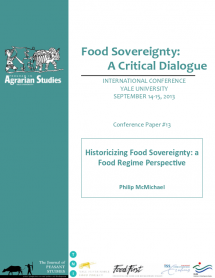Ideas into movement
Boost TNI's work
50 years. Hundreds of social struggles. Countless ideas turned into movement.
Support us as we celebrate our 50th anniversary in 2024.

To historicize food sovereignty is to situate it: first, as a strategic countermovement in/of the food regime; and second, by historicizing the food regime itself to identify the shifting terrain of food sovereignty politics.

To historicize food sovereignty is to situate it: first, as a strategic countermovement in/of the food regime; and second, by historicizing the food regime itself to identify the shifting terrain of food sovereignty politics. While the global agrarian crisis of the late-twentieth century precipitated the movement, it was part of a continuing crisis accompanying the long-twentieth century food regime and its competitive assault on farming systems across the world. This assault, in the name of free trade, development and food security, has imposed a model of ‘agriculture without farmers’ in a world equating industrial efficiency with human progress. Food sovereignty is a culminating protective movement against the deceit of ‘feeding the world’ by undermining farming with the false economy of value relations of the food regime. At the same time, transformation of the current food regime poses new challenges with schemes to capitalize lands in the global South. Whereas in 2000 Vía Campesina claimed: “the massive movement of food around the world is forcing the increased movement of people,” now the massive movement of capital around the world increases the movement of people, and food. Beyond deepening this unsustainable scenario, the capitalization project aims to feed the world a new deceit by converting smallholders into value-chain ‘outgrowers’ for world markets. Such appropriation of food sovereignty claims for smallholder recognition nonetheless confronts smallholders with extractive market relations including a form of land grab. Fallout from the recent ‘food crisis’ indicates that neoliberal re-colonization has the potential to consolidate food sovereignty alliances around the politics of food grabbing.
Philip McMichael is a Professor of Development Sociology, Cornell University. He has authored Settlers and the Agrarian Question (1984), Development and Social Change: A Global Perspective (2012, 5th edition), and Food Regimes and Agrarian Questions (2013), and edited The Global Restructuring of Agro-Food Systems (1994), New Directions in the Sociology of Global Development (2005, with Fred Buttel), Contesting Development: Critical Struggles for Social Change (2010), and Biofuels, Land and Agrarian Change (2011, with Jun Borras & Ian Scoones). He has worked with the FAO, UNRISD, La Vía Campesina, IPC for Food Sovereignty, and the Civil Society Mechanism (CFS). Food Regimes and Agrarian Questions, a volume in ‘Agrarian Change and Peasant Studies’ book series by the Initiatives in Critical Agrarian Studies (ICAS) and published by Fernwood, develops the methodological contributions of food regime analysis, re-examining the agrarian question historically.
Food Sovereignty: a critical dialogue, 14 - 15 September, New Haven.